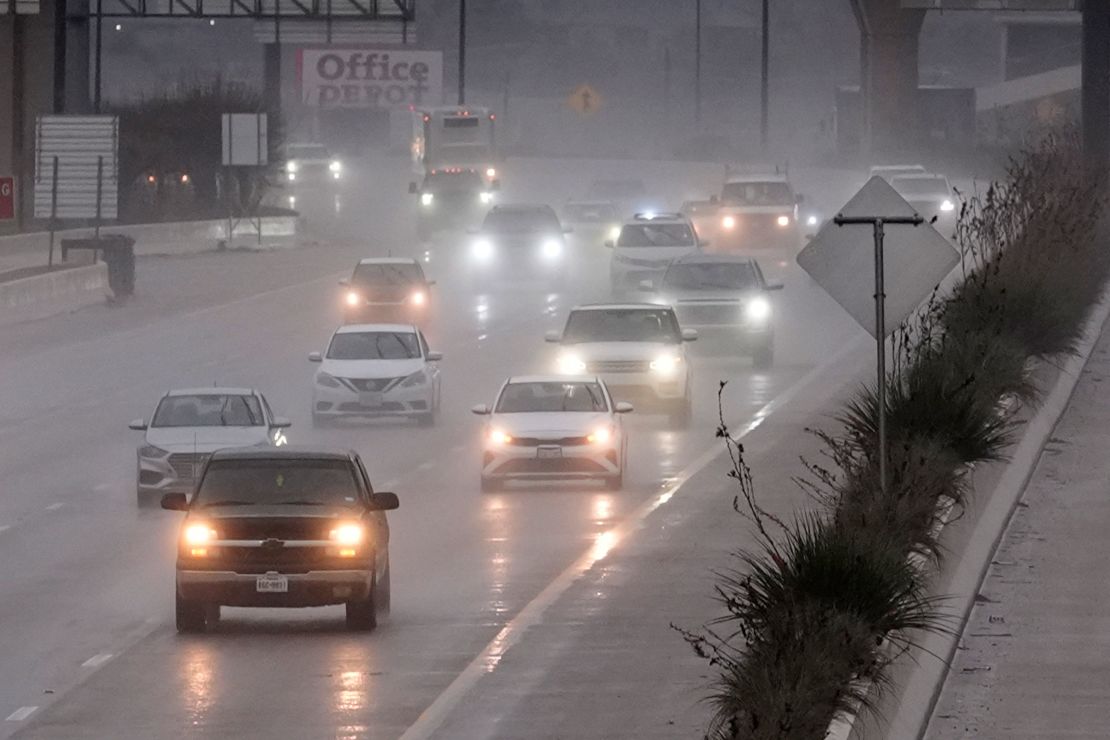CNN
—
Storms across both the western and southern United States threaten flight delays as millions of holiday travelers prepare to close out the year.
On what is expected to be one of the busiest travel weekends of the year, another round of severe thunderstorms is expected to hit the South Saturday with strong tornadoes, damaging winds and large hail from Louisiana to Alabama, according to the National Weather Service. Elsewhere in the country, a series of Pacific storm systems will continue to impact the West into this weekend with periods of strong winds, low-elevation rain and heavy mountain snow, the weather service said.
After nearly 800 flights within, into or out of the US were canceled Thursday, more than 50 have already been canceled for Friday, according to the flight tracking website FlightAware.
On Friday – one of the season’s top three busiest travel days – the Storm Prediction Center warns of a few strong to locally severe thunderstorms for parts of the central Gulf Coast into central Mississippi and Alabama. Large hail, damaging wind gusts and tornadoes are possible.
By Saturday, the severe weather threat level will ramp up from north-central Louisiana to west-central Alabama.
“We do have an increasing concern that there are going to be a lot of storms with a severe weather threat there on Saturday,” Weather Service meteorologist Evan Bentley said. “With it being a pretty active time of year for holiday travel, we want to make sure anyone who’s in that corridor or is traveling through that corridor is aware of the weather threat.”
Thursday brought stormy weather to the South, with a tornado watch in place for western and central Louisiana and far southeastern Texas until 3 a.m. ET. The watch includes Lake Charles and Alexandria, Louisiana, and Port Arthur, Texas.
Texas Gov. Greg Abbott activated state emergency response resources Thursday to prepare for the severe weather conditions, he announced on X.
“As Texans and out-of-state visitors begin traveling after the Christmas holiday, it’s crucial that everyone regularly monitor road conditions, make an emergency plan, and heed the guidance of state and local officials,” Abbott said in a news release.
Travelers’ plans were also thwarted in New Jersey, where a gaping sinkhole opened up along Interstate 80 in Wharton, prompting the state’s Transportation Department to close the interstate eastbound for emergency sinkhole repairs.
The severe weather is rumbling through the US as a record number of travelers are expected to close out 2024, according to AAA. The association projected 119.3 million people will travel 50 miles or more from home from December 21 to January 1. That’s 3 million more travelers than the same period last year.
The Transportation Security Administration says it expects to screen nearly 40 million people from December 19 to January 2 – a 6% increase from last year. Among the busiest travel days will be Friday and Monday, the TSA said.
While much of Thursday’s US flight cancellations were into or out of Dallas-Fort Worth, the series of storms could impact the East Coast by Sunday and potentially lead to additional delays in other parts of the country for those traveling home from the holidays.
Meanwhile, on the West Coast, an active weather pattern is bringing rounds of coastal rainfall, gusty winds, mountain snowfall and dangerous waves across the region as holiday travelers make their way home this weekend.
Damp travel conditions will continue Friday, with rain expected to stretch from the Midwest to the Gulf Coast Friday. Temperatures will be 10 to 20 degrees above normal for the Plains, Midwest and Great Lakes.
Following a marginal risk of severe storms across the South Friday, the threat is expected to ramp up again on Saturday. Damaging wind, hail and tornadoes are likely across Texas, Arkansas, Louisiana, Mississippi and Alabama through Saturday, the weather service said.

A level 3 of 5 risk of severe thunderstorms has been issued Saturday from north-central Louisiana across much of central Mississippi into far west-central Alabama, according to the Storm Prediction Center.
“It appears that all severe-weather modes and hazards could occur, including large hail, damaging wind, and tornadoes as storms steadily develop east-northeastward Saturday afternoon and Saturday night,” the center warned.
Cities under the strongest threat include Shreveport and Baton Rouge, Louisiana, as well as Jackson, Mississippi. Cities including Houston, Memphis, New Orleans, Birmingham and Montgomery all have a lower chance of storms Saturday.
As for Sunday, at least some severe weather risk is expected across the Southeast, though the risk expected to decrease by early next week, according to the weather service.
Rain and snow continue to pelt West Coast
A stormy pattern continues to impact the western US through the weekend. Mountain snow, coastal and low elevation rain, and breezy conditions will impact the Northwest into the Northern Rockies Friday and this weekend.
High wind alerts are in effect across the lower elevations of the Northwest and Northern California, where winds of 40 to 60 mph and isolated gusts of more than 65 mph are expected.
“Damaging winds will blow down trees and power lines. Widespread power outages are expected. Travel will be difficult, especially for high profile vehicles,” the National Weather Service warned.
The winds are fueling high waves across most of the West Coast, where a series of high surf and coastal flood alerts are in place.
Winter weather alerts are in place across parts of the Cascades, Sierra Nevada and Rockies, as rounds of moisture continue to impact the West. Snowfall of 6 to 18+ inches and gusts potentially over 70 mph could reduce visibility, make travel nearly impossible and cause damage to trees and power lines.
The next in a series of atmospheric river-fueled storms is expected to bring another round of coastal and valley rainfall, mountain snowfall, gusty winds and high surf to the West Friday with other storms potentially impact the region Saturday and Sunday.
By the end of the weekend, rainfall totals of 3 to 5 inches are likely through the Washington and Oregon Cascades and the northwest California coastal mountains into the northern Sierra, while snowfall totals of 1 to 3 feet are likely in the highest elevations of the Northwest. Wet weather across the Northwest could also lead to river flooding and mudslides, the weather service warned.











